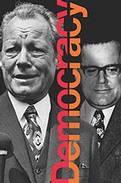Democracy - Wyndhams Theatre 2004
Michael Frayn's new play "Democracy", directed by Michael Blakemore, tells the story of Willy Brandt and of his personal assistant Gunter Guillaume. In the programme notes Frayn tells us that the play is a fictional account of a non-fictional historical record. Yet, despite Frayn calling his play fiction, it seems to me that it is more fact than fiction. He tells us that the biographies of the protagonists are true to the record and the political events the play refers to did happen.
The play begins with the appointment of Willy Brandt after the Bundestag had elected him Chancellor in 1969, the first centre-left Chancellor of the German Democratic Republic, and ends with the collapse of the Berlin Wall. Brandt, we are constantly reminded throughout the play, had "Clean Hands" in that he had no part to play during Hitler's Third Reich, having spent that dreadful period in Germany's history as an exile in Norway from 1933. Even his name Willy Brandt (An assumed name he used in his youth when he was involved in resisting the Nazi Party), was a constant reminder that he had no part in those events. He returned to Germany after the war and participated in the reconstruction of the country, and as Chancellor he signed the "Moscow Agreement", in which 'East Germany' and 'West Germany' recognised each other's existence and borders, and in 1974 both East and West Germany joined the United Nations.
In the play we see the inner workings of Willy Brandt's government. Brandt was idolised by many in the German republic, his message of reconciliation, compassion and peace being warmly welcomed. However, his own personal life and relations with his closest advises was more complex and at times troubling, especially his relationship with his personal assistant, Gunter Guillaume, who spied for East Germany throughout.
Guillaume's servile nature makes him almost invisible within the workings of Brandt's administration as he slowly gains the confidence of Brandt. He greatly admires Brandt and also appears to be motivated by the same desire for reconciliation between East and West that labours so heavily upon Brandt's heart.
The play is in many ways fascinating, the relationship between Brandt, Guillaume and the other members of the government are very human and believable, However, when Guillaume is exposed as a spy and Brandt is finally forced to resign it seems more like an internal scandal within his government, rather than something that could have threatened the peace and stability of Germany, a peace and stability that Brandt had so carefully constructed. The production lacks the crisis and alarm that surely would have followed such a shocking revelation, and whilst the characters are engaging, the dramatic saga of the event is missing.
Peter J Davison's set design is of Brandt's stark and rather barren office in Bonn. A white metal spiral staircase connects the two floors of this split-level stage design, with Brandt's office on the upper level. The walls behind the three desks on the lower level are full of shelves stacked with files, which are put to use at the end of the play!!
There are three excellent performances. Conleth Hill is a sycophantic Guillaume, who despite this trait manages also to be warm and convivial -one sympathises as much for the spy as one does for the Chancellor he unwittingly brings down. Roger Allam brings an almost messianic flavour to his portrayal of Brandt but also captures the dejection that Brandt often struggled with. Whist David Ryall's Herbert Wehner is an impressive shrewd elder statesman.
Alan Bird
Originally published on
